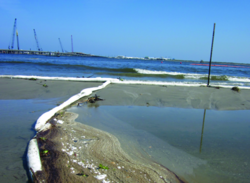Watchdog analysis suggests recent Gulf oil spill was major
 The same watchdog group that showed the federal government was low-balling the estimate of last year's BP oil spill rate is now saying that the size of the latest oil spill in the Gulf of Mexico was also underestimated.
The same watchdog group that showed the federal government was low-balling the estimate of last year's BP oil spill rate is now saying that the size of the latest oil spill in the Gulf of Mexico was also underestimated.SkyTruth, a West Virginia-based nonprofit, analyzed recent satellite imagery of the spill that was first reported on March 18. Assuming the thickness of the 2,427 square-kilometer slick was only 1 micron or one-millionth of a meter, the organization concludes the slick held at least 640,728 gallons of oil.
"That would make it a major spill (more than 100,000 gallons), and a heckuva lot more than the 4 gallons in total that was reported to the National Response Center," SkyTruth states on its blog.
Following last April's explosion of the Deepwater Horizon oil rig, BP and the U.S. government claimed the well was leaking about 1,000 barrels of oil a day. But SkyTruth's analysis of satellite imagery concluded the flow rate had to be at least 5,000 barrels a day and probably far more, leading the government to revise its own estimate upward.
Oil samples from this latest spill were tested by a Louisiana State University scientist who concluded that it matched the chemical fingerprint of the crude oil taken from an Anglo-Suisse Offshore Partners well damaged by Hurricane Katrina in 2005. Houston-based Anglo-Suisse was trying to plug the well when the spill occurred, but it has disputed it was responsible for all of the oil spilled.
The worrisome news about the latest spill's magnitude comes as the region's commercial fishing industry is already reporting problems related to last year's BP oil disaster. Karen Hopkins of Dean Blanchard Seafood on Louisiana's Grand Isle told the Natural Resources Defense Council that catches are way down:
During the first three months of this year, Dean Blanchard bought just 5,281 pounds of sea bob, small shrimp often caught in the winter, compared to 35,740 pounds during the same period in 2009. Karen says catches of black drum, sheephead and vermilion snapper are down significantly this year too. And she worries this may not be the end of it. "Boat captains are terrified this will be like the Exxon Valdez. They had decent catches for several years until some species couldn't reproduce and everything crashed."
(Photo of oil from the recent spill washing up on Grand Isle from the Louisiana Bucket Brigade. To see more of their photos of the spill, click here.)
Tags
Sue Sturgis
Sue is the former editorial director of Facing South and the Institute for Southern Studies.
